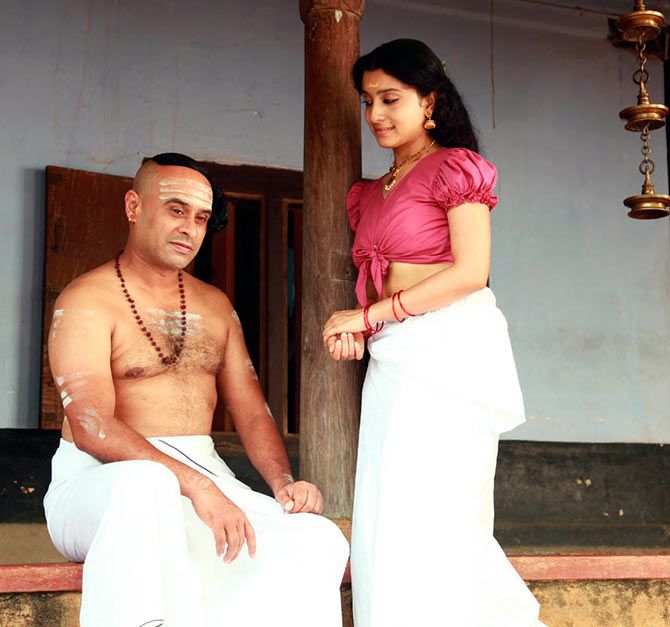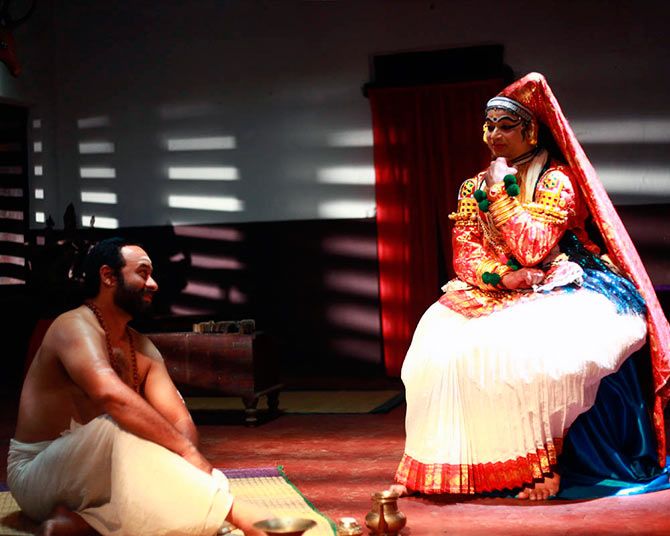'I didn't get any recognition in Kerala for this film and it has definitely hurt me. When the whole world is celebrating the return of Sanskrit, my state is busy ignoring it.'
Vinod Mankara talks about his award-winning film, Priyamanasam.
Director Vinod Mankara's controversial film Priyamanasam on the life of the ancient poet Unnayi Warrier won the National Award for Best Sanskrit film of the year.
The film was in the eye of the storm when the Kerala Chalachitra Acadamy rejected its screening at the IFFK (International Film Festival of Kerala).
Starring Rajesh Hebbar and Pratheeksha Kashi, Priyamanasam is the first Sanskrit film made in 22 years.
In this interview with Rediff.com contributor S Saraswathi, the elated director tells us why this film is so close to his heart.

Congratulations on your second National Award!
Priyamanasam is my dream come true. It is born out of the pain and hard work of the entire crew. The film has been cared, loved, pampered and cherished like a child and very close to my heart.
After 22 years, a Sanskrit film has been made in our nation. It has taken six years of research for its making. So yes, I am extremely proud and delighted to receive this award.
After all the controversy surrounding the film, do you feel a sense of vindication?
Priyamanasam is the third Sanskrit movie ever made to bag the National Award.
When the jury of the Kerala Chalachitra Acadamy rejected the screening of the movie at the IFFK, Priyamanasam was still making waves by getting screened literally in every film festival in India, bagging awards. Now, with the National Award, the cause of this movie is vindicated.
Why do you think the film was rejected by the IFFK?
Priyamanasam has already been screened in destinations such as Goa's IFFI, as the opening film of the Indian Panorama section.
But Kerala, the birthplace of Unnayi Warrier, steadfastly refused to acknowledge it.
Authorities of Kerala State Chalachitra Academy (Motion Picture Academy of the Kerala State) informed me that the movie would not be screened because Hindu deities have been shown in it.
I didn't get any recognition here for this film and it has definitely hurt me. When the whole world is celebrating the return of Sanskrit, my state is ignoring it.

Your film is based on the scholar-poet Unnayi Warrier from Kerala. Why did you choose to make the film in Sanskrit?
To make a movie in Sanskrit was my long cherished dream.
During my college days, I had watched the two Sanskrit movies made by the legendary GV Iyer. I was impressed with the fact that only he had made these Sanskrit movies. I always wondered why others were not making movies in Sanskrit.
Later, reading the works of Kalidasan and Jayadevan, I felt the sweet taste of the language. Priyamanasam is the end-result of my dream. Making Priyamanasam is my attempt to wean away the belief that Sanskrit is a dead language and make it more popular.
It has been 22 years since GV Iyer's film and it is quite astonishing that Sanskrit scholars and the lovers of the language have not taken the initiative to make a movie. I felt my efforts would help pave the way for the resurrection of the language and earn its rightful place and recognition.
Are you well-versed in the language?
Sanskrit was my second language during graduation, and that helped me a lot.
But I wrote the script first in my mother tongue, Malayalam, and later it was read and translated into Sanskrit with the help of Sanskrit scholars.

What inspired you about Unnayi Warrier?
To chronicle the life and work of one of the greatest poets that Kerala had seen.
The subject of the movie is one of the most elegant literary pieces, Nalacharitham and my aim was to portray the richness of his work and chronicle his autobiography.
What is bewildering is that with a single composition, this poor Amabalavasi (one who braids flowers in a temple) has for ages managed to impress Malayalees, lovers of Kathakali dance form and Sanskrit.
Any lover of Kathakali will carry Unnayi Warrier's Nalacharitham in his heart.
What kind of research was involved?
I wandered six long years trying to collect the details of his life. There was no document that testified his existence. All I could gather were stories that sounded more like myths and rumours.
Finally, I found the original manuscript of Nalacharitham and the record which cited that Nalacharitham was performed at the Sree Padmanabha Swami Temple in Trivandrum in 1893.
Nalacharitham Attakatha consists of 11 monologues. I carefully dissected these soliloquys and unraveled the hidden story of Unnayi Warrier's life.
In fact, Kathakali is at the heart and soul of this film considering that Nalacharitham is by far the most popular work in this most revered of art form.
My decision also came at a time when Sanskrit is said to be going through a phase of revival.
Set in 17th century Kerala, a Southern India state, Priyamanasam traces the final years in the life of poet extraordinaire Unnayi Warrier's as he struggles to complete his magnum opus Nalacharitham Aattakatha.

What did you look for in your actors? Were they able to dub for themselves?
I am extremely lucky to have a team of very talented and dedicated artists. Priyamanasam is blessed with artists like Rajesh Hebbar and Pratheeksha Kashi, supported by Meera Sreenarayanan, Rachana Narayanankutty, Devan and Kochu Preman.
This being a different kind of movie, actors had to be specially trained in different skills. The location felt like a university, as we had training sessions for dance and music on one side, and coaching sessions in Sanskrit on the other.
The artists were trained to speak Sanskrit by a Sanskrit scholar. Rajesh Hebbar took great pains to study Kathakali from the renowned Kathakali artist Kalamandalam Narayanankutty.
The male actors dubbed for themselves.
The actresses could have dubbed themselves also but for the sake of sound quality, I engaged dubbing artists. The whole crew was united as a family dedicated to their work.

Was it difficult to find a producer?
Yes, people laughed at me at first.
Then Baby Mathew Somatheeram produced the film under the banner Soma Creations Private Limited.
Tell us about your next project Kamboji.
Kamboji is not just a mere raga but an epitome of passionate love. It is an intense love story set in Malabar in the 1940s, centering on Mohiniyattam and Kathakali. Great importance has been given for music as the film is been blessed with the last songs of the Jnanapeet winner, the great ONV sir.
Famous dancers and great artists like Vineeth and Lakshmi Gopalaswami play the lead roles.
Kamboji is produced by Lakshmi M Padmanabhan under the banner of Padma Lakshmi Productions. The shooting will start on May 8.











 © 2025
© 2025